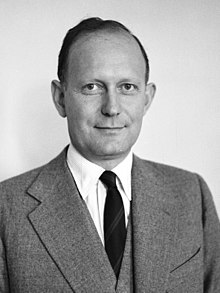
Back سي دوغلاس ديلون Arabic سى دوجلاس ديلون ARZ سی. دوقلاس دیلون AZB C. Douglas Dillon German C. Douglas Dillon Finnish Douglas Dillon French קלרנס דאגלס דילון HE Douglas Dillon ID C. Douglas Dillon Italian C・ダグラス・ディロン Japanese
C. Douglas Dillon | |
|---|---|
 Dillon in 1955 | |
| 57th United States Secretary of the Treasury | |
| In office January 21, 1961 – April 1, 1965 | |
| President | John F. Kennedy Lyndon B. Johnson |
| Preceded by | Robert B. Anderson |
| Succeeded by | Henry H. Fowler |
| 21st United States Under Secretary of State | |
| In office June 12, 1959 – January 4, 1961 | |
| President | Dwight D. Eisenhower |
| Preceded by | Christian Herter |
| Succeeded by | Chester Bowles |
| 2nd Under Secretary of State for Economic Affairs | |
| In office July 1, 1958 – June 11, 1959 | |
| President | Dwight D. Eisenhower |
| Preceded by | William L. Clayton |
| Succeeded by | George Ball |
| United States Ambassador to France | |
| In office March 13, 1953 – January 28, 1957 | |
| President | Dwight D. Eisenhower |
| Preceded by | James C. Dunn |
| Succeeded by | Amory Houghton |
| Personal details | |
| Born | Clarence Douglass Dillon August 21, 1909 Geneva, Switzerland |
| Died | January 10, 2003 (aged 93) New York City, New York, U.S. |
| Political party | Republican |
| Spouses | Phyllis Chess Ellsworth
(m. 1931; died 1982)Susan Sage
(m. 1983) |
| Children | 2, including Joan |
| Parent(s) | Clarence Dillon Anne McEldin (née Douglass) |
| Education | Groton School |
| Alma mater | Harvard College (BA) |
| Signature | |
| Military service | |
| Allegiance | |
| Branch/service | |
| Years of service | 1941-1946 [1] |
| Rank | |
| Battles/wars | World War II |
| [3] | |
Clarence Douglas Dillon (born Clarence Douglass Dillon; August 21, 1909 – January 10, 2003) was an American diplomat and politician, who served as U.S. Ambassador to France (1953–1957) and as the 57th Secretary of the Treasury (1961–1965). He was also a member of the Executive Committee of the National Security Council (ExComm) during the Cuban Missile Crisis. His conservative economic policies while Secretary of the Treasury were designed to protect the U.S. dollar.
- ^ "National Archives Catalog. Dillon, C. Douglas (Clarence Douglas), 1909-2003. Person Authority Record". National Archives. Retrieved May 1, 2020.
- ^ "National Archives Catalog. Dillon, C. Douglas (Clarence Douglas), 1909-2003. Person Authority Record". National Archives. Retrieved May 1, 2020.
- ^ "C. Douglas Dillon, former Treasury secretary and Harvard overseer, dies at 93". Harvard Gazette. Harvard University news office. January 16, 2003. Archived from the original on March 13, 2003. Retrieved March 27, 2009.